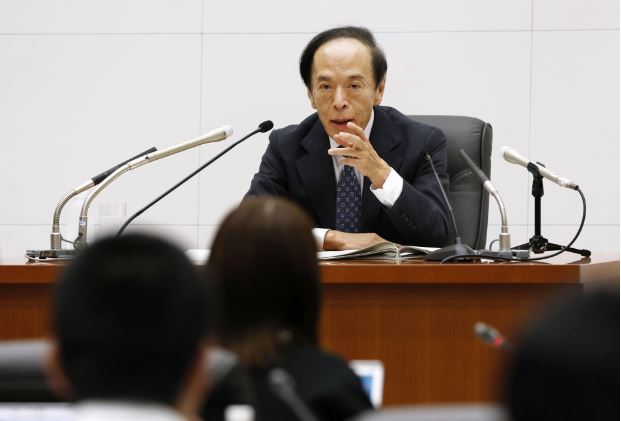
The governor of the Bank of Japan, Kazuo Ueda, stated on Friday, after the central bank maintained its monetary easing policy, that it is still premature to foresee a change, either the end of negative interest rates or its program of performance limits.
Despite market expectations that the Bank of Japan could reduce monetary stimulus sooner rather than later, it did not signal a change in its dovish stance, maintaining that stable inflation is not in sight.
Sustained wage growth is one of the critical factors in determining whether the time has come for a policy change, Ueda told a news conference at a time when rising prices are strangling budgets. families due to the fall in real wages.
At the end of a two-day meeting, the Bank of Japan maintained its current policy framework. Under its yield curve program, short-term interest rates are set at minus 0.1% and 10-year Japanese government bond yields are around 0%.
The unanimous decision came as the Council’s nine members examined the effects on financial markets and the broader economy of the decision at their previous meeting in July to allow the 10-year bond yield to rise to 1.0. %.
“If we can foresee that the inflation target will be met, then we will consider a policy change. Right now, uncertainty about the economy and prices is extremely high and we are not close to deciding the timing of a policy change or what measures to take,” Ueda said at the press conference after the meeting.
“We will patiently continue monetary easing to achieve the inflation target in a sustainable and stable manner, while responding flexibly to a changing environment,” he added.
Ueda was careful not to hint at a premature shift towards tightening monetary policy, renewing his promise to take action without hesitation if the need arises. In his view, the risk of inflation falling short of the Bank of Japan’s target is much greater than the risk of it exceeding it.
The meeting was the first since his comments in an interview with a Japanese newspaper were perceived as hinting at an end to negative interest rates if prices and wages rise. He also said the central bank would have enough information and data to make a decision by the end of the year.
Friday’s decision to maintain monetary policy means the Bank of Japan will remain far behind the US Federal Reserve and the European Central Bank when it comes to raising rates.
Although the Bank of Japan stated that inflation expectations are rising, it is not yet convinced that stable inflation is accompanied by sustainable wage growth. However, the headline inflation rate remained above its 2% target in the 17 months to August, reflecting rising import costs.
Before the meeting, financial markets began to anticipate a future after monetary easing. The 10-year Japanese government bond yield ended Friday at 0.740%, after reaching 0.745% the previous day, its highest level in 10 years.
Ueda was careful not to hint at a premature shift towards tightening monetary policy, renewing his promise to take action without hesitation if the need arises
The yen is not far from the psychologically important line of 150 against the US dollar, testing the tolerance of Japanese authorities wary of its rapid depreciation. The currency depreciation is a byproduct of the Bank of Japan’s dovish tilt.
“Due attention needs to be paid to developments in financial and currency markets and their impact on economic activity and prices in Japan,” the BOJ stated.
The board decided that the BOJ will offer to buy 10-year bonds at a fixed rate of 1.0 percent, the maximum limit allowed by the yield capping program, in principle every business day.
Japan’s trade deficit falls to 930.5 billion yen, exports to China plummet
Asked about the upward trend in long-term yields, Ueda said it coincides with rising inflation expectations, adding: “There is not much to worry about.”
The BOJ will continue its asset purchases, including exchange-traded funds with an annual limit of 12 trillion yen, amid “extremely high” economic uncertainty, as the global wave of monetary tightening threatens to slow growth.
The headline inflation rate remained above its 2% target in the 17 months to August, reflecting rising import costs
After years of deflation, Japan has seen some positive progress towards stable inflation, with the best wage increases in three decades, the result of talks between unions and employers this year.
The output gap, a key supply and demand indicator used to assess inflation trends, turned positive for the first time in four years in April-June, according to Cabinet Office data.
In addition to a lack of confidence in the inflation outlook, BOJ council members may not want to rock the boat at a “sensitive” time when Prime Minister Fumio Kishida appears likely to dissolve the lower house to convene a vote. early elections this year, said Shunsuke Kobayashi, chief economist at Mizuho Securities.
“In this case, the Bank of Japan is preparing for the upside risks of inflation and is aware of the weakness of the yen. If the yen’s decline continues to lift inflation forecasts, the BOJ will have to move toward removing monetary stimulus,” Kobayashi said.
The weakness of the yen affects the Japanese economy in both ways. But the recent and precipitous fall of the yen, whose real effective exchange rate is already at historic lows against its counterparts, has aggravated the pain of households by accelerating the inflation of imported products and exposing the vulnerability of a poor country in resources.
Kishida has unveiled plans to compile economic and inflation relief measures in October, as consumers feel the pinch from rising prices of everyday goods at a time when real wages continue to fall.
Ueda acknowledged that inflation is becoming a burden, and stated that he is “extremely” concerned that real wages are not increasing. Since inflation has not eased as much as expected, the Bank of Japan will examine new data when it releases a new outlook report in October.

Source: https://reporteasia.com/mercados/bursatil/2023/09/23/banco-de-japon-mantiene-postura-moderada/

